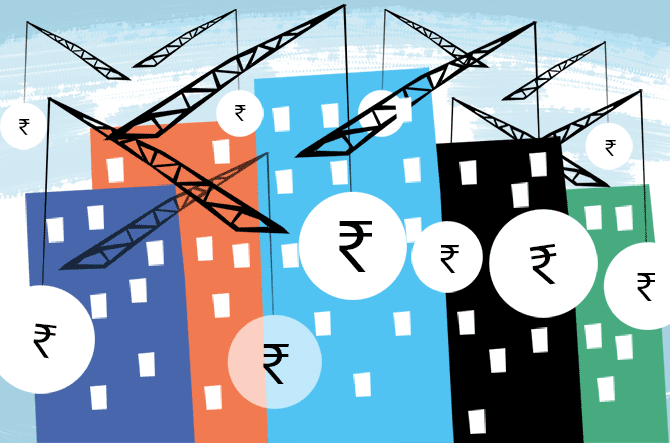 | « Back to article | Print this article |
Home stretch for real estate investment trusts as strength of the office leasing market and Q2 results show endurance.

After lagging behind benchmarks and broader indices over the past five years, real estate investment trusts (Reits) have outperformed them since the start of 2024.
The four listed Reits have posted an average return of 16 per cent year-to-date, compared to 9.9 per cent for the S&P BSE Sensex and 11 per cent for the National Stock Exchange Nifty.
Recent data on the strength of the office leasing market, coupled with second-quarter (Q2) results for 2024-25 (FY25), indicate that Reits’ rally still has legs.
During the July-September quarter (Q2) of FY25, gross leasing in the sector surged to 24.7 million square feet (msf), marking a 69 per cent rise over the same period last year.
This was the fourth consecutive quarter with gross absorption hitting or exceeding 20 msf.
With gross leasing for the first nine months of 2024 reaching 66 msf, up 41 per cent year-on-year (Y-o-Y), Nuvama Research predicts that gross absorption will surpass 80 msf this year.
Net leasing in the quarter also climbed 59 per cent Y-o-Y to 12.2 msf, while supply stood at 9.5 msf, an 8 per cent decline Y-o-Y.
The robust leasing trends indicate that demand is outstripping supply, leading to a 170-basis point drop in vacancy rates Y-o-Y to 16.5 per cent.
Net leasing in 2024 could potentially set a new record, breaching the 43 msf milestone of 2019.
Analysts at Nuvama Research, led by Parvez Qazi and Vasudev Ganatra, foresee a slight dip in vacancy levels over the medium term, with annual rental growth expected to accelerate.
Cost pressures are likely to drive global firms to increase outsourcing to India, boosting office demand, they add.
They identify Prestige Estates, Brigade Enterprises, and Embassy Office Parks Reit as prime picks in the office space sector.
Alongside overall leasing, office rentals are also projected to end the year at multi-year highs.
Real estate services firm Colliers recently reported that average rents across the top six office markets in India have exceeded pre-pandemic levels for the first time this year, as of Q2FY25.
“As demand solidifies in Indian commercial real estate, annual space take-up of around 60 msf is poised to become the new norm in the medium term,” says Arpit Mehrotra, managing director of office services at Colliers India.
Vimal Nadar, senior director and head of research at Colliers India, expects average office rents to continue to firm up, with up to 10 per cent annual growth across key cities in 2024.
A recent report by HSBC Global Research on the Asian commercial real estate market highlights India as a key growth area.
Macro and structural trends are driving rising demand from multinationals and tech companies, including Nvidia, for quality office space.
HSBC cites factors like the return of employees to offices, the rise of flexible office spaces, ownership by large institutions, and changes in regulations governing special economic zones as reasons for its bullish outlook.
Despite steady growth in office rentals since 2011, stocks have yet to fully reflect the sector’s strong fundamentals, making valuations appealing, according to analysts led by Michelle Kwok at the brokerage.
Their top picks are Embassy Reit and Brookfield India Reit, with estimated annual growth of 13-15 per cent over the next five years.
Embassy Reit’s Q2FY25 results were strong.
The company reported its best first-half leasing performance at 4 msf, up 29 per cent Y-o-Y.Occupancy rose to 87 per cent, up from 83 per cent in Q2 of 2023-24 (FY24), while rents increased 5 per cent Y-o-Y to Rs 89 per square foot.
The management has raised its FY25 leasing target to 6.5 msf from 5.6 msf and expects occupancy to reach 88 per cent by year-end.
Overall portfolio occupancy improved to 87 per cent at the end of September, compared to 83 per cent in Q2FY24.